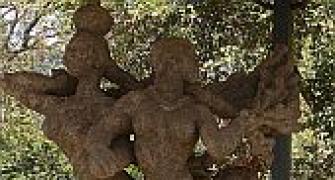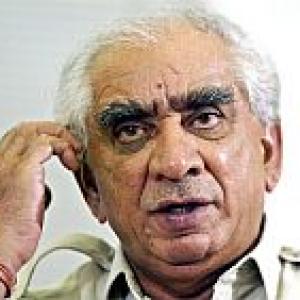As Tagore's 150th birth anniversary became a trending topic on Twitter, the social media site, it seemed like a good time to ask which Tagore we were celebrating. (Sticklers will point out that we're celebrating a year early technically, the Nobel Prize-winning poet and prolific writer would have turned 149, not 150, today. Try telling them that in Shantiniketan.)
There are really three Tagores who have emerged over the last century. The first, Rabi Thakur, is venerated--almost literally--by the Bengalis. The entire Rabindra Rachanabali, his collected works, is still a prized wedding gift, the potters of Chitpur and Kumartuli do a thriving trade in Tagore busts, his poems and songs are the background to the bustle of any Bengali household, and children still perform his play, Tasher Desh (The Kingdom of Cards) in schools. (His non-fiction--the essays, letters and criticism--remains largely unread, even among this group.)
Rabi Thakur is a living figure in this tradition, celebrated the most for his songs, and even the generation that grew up distanced from their language will know at least the Satyajit Ray films based on his works, Charulata and Ghare-Baire among them. The Bengali worship of Rabi Thakur can strain the patience of some, as Vikram Seth noted in A Suitable Boy, where Kakoli scandalises her mother by warbling, "Rabi Thakur, R Tagore/ Ohe what a bore!" But Kakoli represents a relatively tiny fraction of apostates among the vast majority of the devout, in India and in Bangladesh.
For the rest of India, there's the official Tagore. Despite the availability of translations, Tagore is more celebrated than read in this world. He's known by the kind of useful shorthand that precludes actual engagement: one of the Architects of Modern India, off to a side in the nationalist pantheon, the man who wrote Jana-Gana-Mana, our national anthem, and most crucially, as the winner of the Nobel Prize for Literature. He doesn't have to be read, except by literature lovers and dedicated readers. Instead, he functions as a symbol: Tagore stands for patriotism and success, the value we pay lip service to, and the value we actually worship.
What's lost in this version of Tagore is heartbreaking. By ironing him out, we've forgotten the Tagore who made his mark as a poet by inventing a Vaishnava poet, Bhanusingh, whose "rediscovered verses" were accepted by the literary canon until he confessed that the poems that made up Bhanusingher Padabali were his own invention.
We've also forgotten the Tagore who held his own in debates with Gandhi: he had his own views on the usefulness of the charkha, they argued over nationalism, and Tagore disliked the negativity that he felt was an inextricable part of a Non-Co-operation Movement. And we've forgotten the young man who wrote the first proper short story in Bengali, whose sympathy to women shows in all those gorgeous portraits of the Sucharitas and Charus who struggled against the constraints of their world.
The one Tagore poem most people can quote is, Where the mind is without fear and the head is held high/ Into that valley of freedom, my father, let my country awake. But that sentiment, beautiful as it is, obscures the intelligence of the writer who could craft a fierce debate between tradition and modernity; fanaticism, faith and liberalism in the deadly face-off between a king and his royal priest in Rajarshi.(This, one of the greatest and most contentious of Tagore's early works, remains untranslated though the stage versions, Visarjan and Raj-Rakht, will be familiar to some.)
And the third Tagore is the mystic visionary and poet the West fell briefly in love with. W B Yeats was his champion, rendered rhapsodic by Tagore's Gitanjali: "He writes music for his words." But Yeats was also enraptured by his vision of Tagore as a kind of living saint, a poet of religion and nature, a man who could render the ancient spirituality of the East into terms that might ravish the ears of the West. Tagore's Nobel was also awarded, approvingly, as proof of the "rejuvenating efforts of the Christian Mission in India"; without English, the "native" Gitanjali would, in effect, have not existed.
In this version, "Gurudev" was one in a long line of Oriental mystics to beguile the West. Rumi is one of the few poets to have endured; but in the supermarket souks of Europe, Tagore's Gitanjali is no longer to be found. Rescuing Tagore from sainthood, from the pedestal or from oblivion could take another 150 years.









